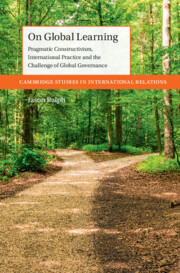 On Global Learning
On Global Learning Book contents
- On Global Learning
- Cambridge Studies in International Relations: 165
- On Global Learning
- Copyright page
- Dedication
- Epigraph
- Contents
- Acknowledgements
- 1 Introduction
- 6 International Practice and Global Security
- 7 International Practice and Climate Change
- 8 International Practice and Global Health
- 9 Conclusion
- References
- Index
- Cambridge Studies in International Relations: 165
6 - International Practice and Global Security
from Part II
Published online by Cambridge University Press: 07 September 2023
- On Global Learning
- Cambridge Studies in International Relations: 165
- On Global Learning
- Copyright page
- Dedication
- Epigraph
- Contents
- Acknowledgements
- 1 Introduction
- 6 International Practice and Global Security
- 7 International Practice and Climate Change
- 8 International Practice and Global Health
- 9 Conclusion
- References
- Index
- Cambridge Studies in International Relations: 165
Summary
This chapter begins the application of Pragmatic Constructivism by interpreting and assessing how, as a community of practice at the macro level, international society has responded to mass atrocity and its challenge to the practices of state sovereignty. It demonstrates how political mobilization on behalf of excluded publics (vulnerable populations) contributed to a reimagining of sovereignty as a responsibility to protect, as well as a normative reassignment of that responsibility to international society when states ‘manifestly fail’. It applies the two tests – inclusionary reflexivity and deliberative practical judgement – to the micro level by assessing the working practices (e.g. penholding, veto reform) of the UN Security Council. While greater inclusivity signposts ways in which the Council can better respond to the public interest, the impact of micro-adaptation is ultimately contingent on a deeper level of change in the identity of member states. Practices of atrocity prevention in the R2P context can act as a pedagogic tool, helping to mobilize the transnational activism that is a necessary part of that progressive change. This discussion extends to nuclear atrocity prevention and the way vulnerable publics deconstructed the Cold War, a lesson that should inform a renewed commitment to deep arms control practices.
Keywords
- Type
- Chapter
- Information
- On Global LearningPragmatic Constructivism, International Practice and the Challenge of Global Governance, pp. 157 - 183Publisher: Cambridge University PressPrint publication year: 2023


